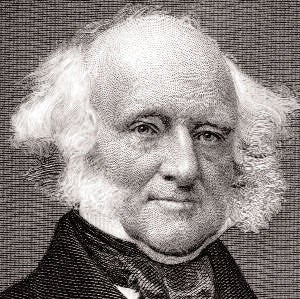Martin Van Buren
8th president - 1837-1841

The only person apart from Thomas Jefferson to occupy all three great offices of the US state – Secretary of State, Vice-President and President – Martin Van Buren probably had more impact in the first two than in the third. A protégé – some would say a favourite – of Andrew Jackson, he was as fastidious as Jackson was coarse; and, with him, was largely responsible for the creation of the Democratic party.
Like Jackson, he was an enthusiastic proponent of the "spoils" system – that is, the use of patronage to shore up political support.
The main events of his presidency were the financial panic of 1837 and the economic crisis that followed it; his lacklustre response – he was more concerned to protect government deposits from unstable banks than to explore fiscal remedies or provide public relief measures – probably put paid to his chances of re-election. His opponents mocked him as "Martin Van Ruin".
Van Buren's presidency was also associated with the resettlement of large numbers of Native Americans – including the notorious "Trail of Tears" in which 15,000 Cherokees were forcibly removed from Georgia and around one in four died en route to their new homes in what is now Oklahoma.
Such horrors did him little harm politically. The same could not be said of his decision to reject Texas's application for membership of the Union, (for fear of provoking war with Mexico); many southern politicans were alienated as a result. Nor did he get the credit that he arguably deserved for averting another war with Great Britain over covert US support for anti-British insurgents in Canada.
Resoundingly defeated in 1840, he attempted a comeback in 1848 as a representative of the short-lived Free Soil Party, which opposed slavery. He died in 1862.
In his own words
"As to the presidency, the two happiest days of my life were those of my entrance upon the office and my surrender of it."
In others' words
"He is what the English call a dandy. When he enters the senate chamber in the morning, he struts and swaggers like a crow in the gutter. He is laced up in corsets, such as women in town wear, and, if possible, tighter than the best of them." Davy Crockett
Minutiae
A middle-class man who aspired to the aristocracy, Van Buren was famous both for his immaculate dressing and for his lavish furnishing of the White House. His critics particularly objected to the "golden spoons" he was alleged to use.
He enjoyed opera, fine wine and occasional gambling – usually on the outcome of elections.
His autobiography makes no mention of his wife.
Join our commenting forum
Join thought-provoking conversations, follow other Independent readers and see their replies
Comments
Bookmark popover
Removed from bookmarks